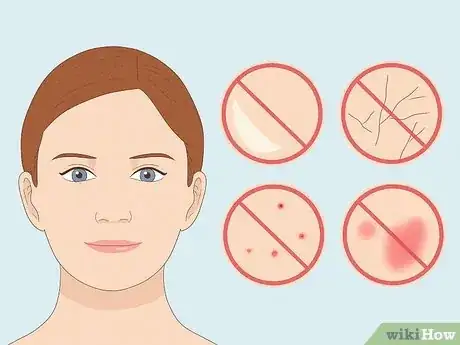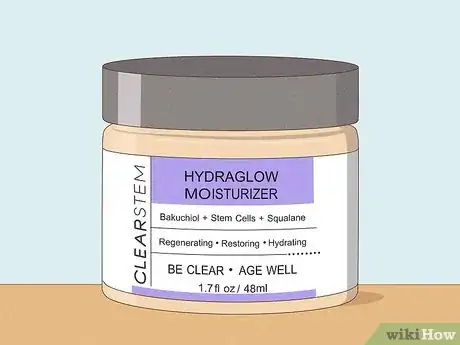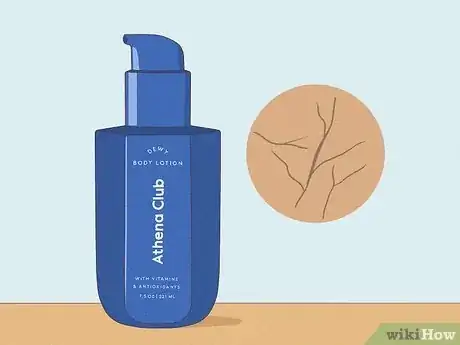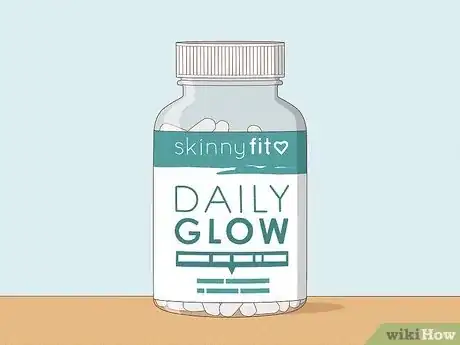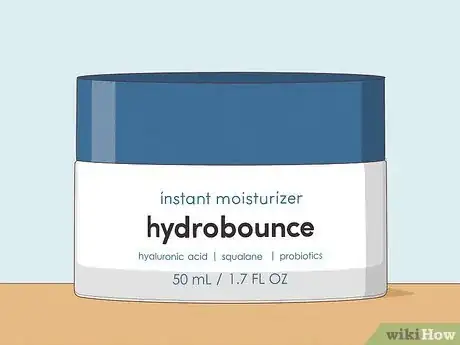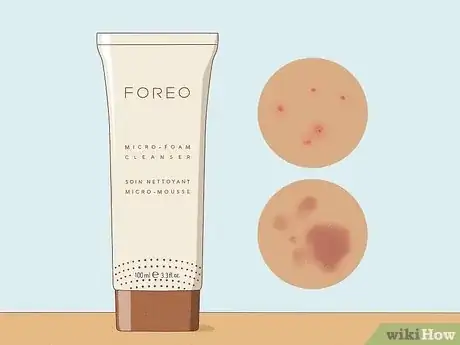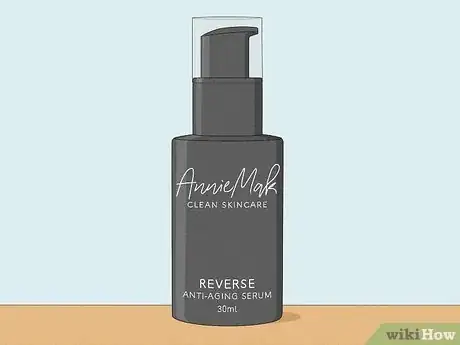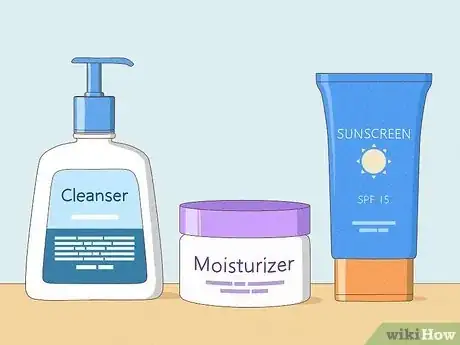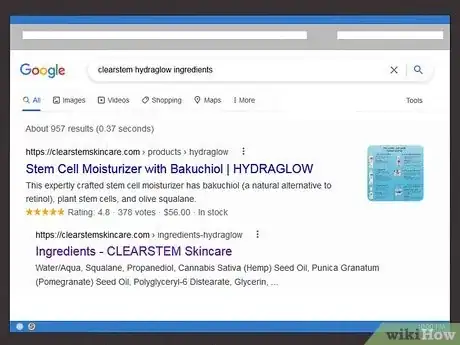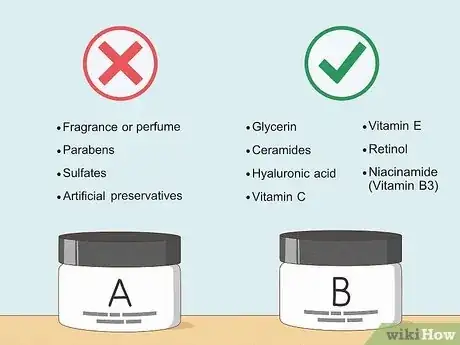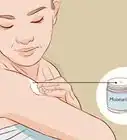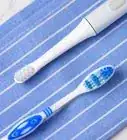This article was co-authored by Indy Chabra, MD, PhD and by wikiHow staff writer, Sophia Latorre. Dr. Indy Chabra is a Board Certified Dermatologist and a Board Certified Mohs Micrographic Surgeon. He is the Founding Member of DMC Dermatology & Mohs based in Tucson, Arizona. With over 15 years of experience, he provides medical, surgical, and cosmetic dermatology care for adult and pediatric patients. Dr. Chabra earned a BS in Chemistry and Biological Sciences and an AB in Economics from Stanford University. He also received his MD and PhD in Microbiology and Genetics from Stony Brook University. He completed his Dermatology residency at the University of Pittsburgh Medical Center (UPMC), Pittsburgh. While at UPMC, Dr. Chabra received extensive training in complex Medical Dermatology, hair and nail conditions, Pediatric Dermatology, Cosmetic Dermatology, and Mohs Skin Cancer Surgery. Dr. Chabra is a Fellow of the American Society for Mohs Surgery, a Fellow of the American Academy of Dermatology, and a Fellow of the American Society for Dermatologic Surgery. Dr. Chabra also provides in-patient Dermatology consults at Tucson Medical Center.
This article has been viewed 1,844 times.
With so many products in the skincare market these days, it can be tough to tell what will work, what won’t, and what the best options are for you. We’re here to help! First of all, it’s essential to use skincare products and ingredients that are designed for your specific skin type. We’ll walk you through how to determine your skin type and choose the right products based on your skincare goals. Plus, we’ll tell you which ingredients to look for and avoid, and even give you expert advice on how to create a daily skincare routine that leaves you glowing.
Steps
Determining Your Skin Type
-
1Normal Skin If you have smooth, firm skin, no excessively oily or dry patches, rarely experience breakouts, and your skin doesn’t typically react to new products or weather changes, you likely have normal skin. That means your skin can happily tolerate most ingredients. Experiment with skin care products—using a variety of cleansers, toners, moisturizers, and serums—until you find which ones you like the best.
-
2Oily Skin Oily skin is not hard to spot, as your skin probably appears to have a sheen to it, and blotting sheets or mattifying powders are your best friend. You’re likely to find that make-up products don’t stay put all day long, especially on and around the T-zone, which is usually your oiliest area. There are benefits to oily skin though, which include fewer and less pronounced wrinkles as you age.
- Controlling shine is probably your top concern with oily skin, so avoid products that contain mineral oil, petroleum, and alcohol. Also, if you have oily skin, look for products that are labeled as “non-comedogenic” so they won’t clog your pores.
- Oil-free moisturizers and clay masks are great for keeping your skin hydrated while reducing shine. Just be sure to not over-wash your face with products that contain drying ingredients like alcohol, as drying out your pores can actually cause your skin to produce more oil to compensate.
Advertisement -
3Dry or Dehydrated Skin Dry skin is caused by a lack of natural oils which leads to flaky and cracked skin that may feel itchy and overly sensitive. It can be exacerbated by environmental and lifestyle factors, or a chronic condition, such as eczema. Dehydrated skin occurs when your skin barrier can't retain enough moisture. Your skin might feel tight or have a shiny, papery appearance with fine lines when the skin is pinched together.
- Apply a rich moisturizer several times a day—especially after washing—to help to lock in moisture.
- Avoid using harsh soaps or skin care products that are heavily fragranced or contain citrus oil. If your skin is dehydrated, look for water-based skincare products and try to drink 2 litres (8.5 c) of water each day.
- Using a humidifier to keep the air in your home warm and moist will also help heal and retain the skin barrier.
-
4Combination Skin If your skin feels dry in some areas and oily in others (particularly the T-zone), you probably have combination skin. When it comes to the best skin care products for combination skin, it’s all about balance. Steer clear of alcohol-based products, target problem areas (like wrinkles or acne) with appropriate treatments, and use toners to even out your skin.
-
5Acne-Prone Skin If you frequently experience breakouts or are in a constant battle with blemishes, you have acne-prone skin. Your pores may tend to clog easily, which makes you more susceptible to blackheads, whiteheads, pustules, and other blemishes when compared to other skin types. It’s a misconception that only oily skin is acne-prone—dry skin can also be prone to blemishes.
- To help calm the skin and clear blemishes, use cleansers and moisturizers that are specially formulated to treat acne and minimize breakouts. Look for non-comedogenic products with acne-fighting ingredients such as retinol, salicylic acid, clay, and benzoyl peroxide.
- Additionally, try double cleansing to ensure that your skin is free of makeup and other impurities before you apply treatments and moisturizers.
-
6Sensitive Skin Signs you have sensitive skin include frequent rashes, uneven texture, flushed skin, patches of irritation, and stinging or burning after using a skincare product. Sensitive skin can be caused by a multitude of factors such as allergies, genetics, and environmental factors. If you have sensitive skin, you’re more at risk of irritation or breakouts when using skincare and beauty products.
- To avoid irritation, steer clear of fragranced skincare products and other potential irritants such as alcohol and antibacterial ingredients. Instead, opt for skincare products that have calming and anti-inflammatory properties, including ceramides and niacinamide.
- For sensitive skin, use moisturizers with ceramides. Ceramides are components of our natural moisturization factor.
-
7Mature Skin While the pace at which skin ages varies from person to person, the signs of mature skin are fairly easy to spot. They include fine lines and wrinkles, dark spots, dullness, and more dryness than when you were younger. To take care of mature skin, use products that help repair past damage and prevent future damage.
- You can create an anti-aging regimen for your skin at any age, with daily SPF being key to slowing the signs of aging. There are plenty of active ingredients that can boost collagen and increase cell turnover, such as vitamin C and retinoids.
Best Products by Skincare Goal
-
1Best for Younger-Looking Skin: ClearStem HydraGlow Stem Cell Moisturizer The HYDRAGLOW Stem Cell Moisturizer from CLEARSTEM is the best skincare product for all skin types if you're looking for softer, healthier, and younger-looking skin. This powerful stem cell moisturizer is packed full of natural ingredients—but no toxins—and has nothing that can clog your pores. This moisturizer is suitable for all skin types, contains natural anti-aging and anti-acne ingredients backed by science, is free of hormone disruptors, and is vegan, cruelty-, silicone-, and gluten-free. The scent may be a bit strong for some people, but the fragrance isn’t artificial.
- This luxurious moisturizer can not only be used to repair skin in the morning and overnight, providing hydration, protecting your skin barrier, and providing a perfect base for makeup. Simply apply a generous amount to a clean face and neck for glowing skin.
- This silky and lightweight moisturizer contains 3 primary active ingredients, the combination of which is designed to train your skin to look younger while you sleep. These natural ingredients are:
- Bakuchiol: This vegan ingredient is found in the leaves and seeds of the Psoralea corylifolia plant. It acts as a natural alternative to retinol, with the same anti-aging and anti-acne effects. However, it is generally better at causing less skin irritation, dryness, or sun sensitivity.
- Squalane: Squalane is a natural lipid that is very light, making it a great hydrating ingredient for acne-prone skin. It also acts as an antioxidant for fresher, younger-looking skin.
- Stem Cells: Made up of amino acids and peptides, stem cells are excellent at helping to rejuvenate the skin. They work by repairing the skin on a cellular level, which promotes cell turnover. This can lead to an improved appearance of fine lines and wrinkles as well as improved skin texture and tone.
-
2Best for Dry Skin: Athena Club Dewy Body Lotion If you’re looking for a body lotion to soothe dry skin, making it more supple and hydrated, the Dewy Body Lotion from Athena Club is a great choice. Described as “a multivitamin for your skin,” this body lotion is formulated with natural, skin-loving ingredients that will instantly nourish your skin, leaving it looking supple and dewy. The blend of vitamins, omega fatty acids, and antioxidants work together to keep your skin healthy and hydrated. When used every day, you’ll notice your skin starting to feel smoother and look brighter. The formula is nourishing but lightweight, so it absorbs quickly into the skin without a greasy residue. You can go from shower to shirt in minutes.
- Proudly made in the USA, the cream is packed with skin-loving nutrients, non-GMO, cruelty-free, and contains no alcohol. It’s kind to the environment and to the skin. There’s also a subscribe and save option.
- This body cream comes in three pleasing scents—rose, sage, and lime—which are subtle but long-lasting. However, the addition of fragrance means that the body cream may not be suitable for use on your face, particularly if you have sensitive or acne-prone skin. If you do intend to try the nourishing body lotion on your face, do a small patch first to make sure that there is no irritation or adverse reaction.
-
3Best Skincare Supplement for Brighter Skin: SkinnyFit Daily Glow Our top skin care supplement is Daily Glow from SkinnyFit, which can help you glow from head to toe thanks to its blend of all-natural ingredients promoting brighter, more youthful skin. Each capsule contains a combination of B vitamins, vitamins A, C, and E, plus zinc and calcium. Combined, these help promote youthful skin by fighting free radicals, brightening your complexion, and stimulating healthy levels of collagen production. These powerful vitamins and minerals also support healthy hair and nails, protecting against environmental damage.
- For the best results take 2 capsules a day with 8 ounces (1 cup) of water.
- The Daily Glow supplement is made of all-natural ingredients and packed with vitamins and minerals. It’s also dairy-free, gluten-free, soy-free, and non-GMO.
- This option is on the expensive side for a 30-day supply. However, if you’re not satisfied with how the supplement is working for you, there’s a 90-day money-back guarantee.
-
4Best for Hydration: Hers Hydrobounce Instant Moisturizer The Hydrobounce Instant Moisturizer offers lightweight hydration, locking in moisture for bouncy, plump, healthy skin. The non-greasy formula makes it suitable for all skin types and it’s paraben-free, cruelty-free, and vegan. Hydrobounce can be used to lock in moisture after cleansing at the start of the day and pairs well with retinoids (even prescription strength) in your nighttime skincare regime.
- Each travel-friendly jar of cream comes with its own dedicated scoop to avoid contamination with bacteria during application.
- Developed with dermatologist-trusted ingredients, this moisturizer contains a formulation designed to penetrate deep into the skin to nourish and hydrate the skin. It does have a long ingredient list though, which can cause problems for those with allergies. The primary active ingredients are:
- Probiotics: A blend of balancing microorganisms that support and strengthen your skin microbiome and barrier, helping to protect against breakouts.
- Hyaluronic acid: Occurring naturally in the body, hyaluronic acid helps the skin retain moisture, plumping up the skin to reduce the appearance of fine lines and wrinkles.
- Squalane: Helps strengthen the skin's barrier to protect against environmental factors for a glowy, bouncy complexion.
-
5Best Cleanser for Sensitive Skin: Foreo Micro-Foam Cleanser If you have sensitive or acne-prone skin, you’ll love the Micro-Foam Cleanser from Foreo, thanks to its kind-to-skin ingredients and fragrance-free formulation. Plus, this cleanser is vegan and cruelty-free and contains none of the common skin irritants, including silicones, sulfates, and mineral oils. This creamy cleanser transforms into delicate micro-bubbles that gently lift away make-up and impurities from within the pores to purify the skin, all without stripping it of its natural oils.
- Use a pea-sized amount, morning and night, as part of your regular skincare regime. It’ll reveal brighter-looking skin from the first use.
- While it can be used on its own, Foreo recommends you use it in conjunction with its T-Sonic Luna devices to get the maximum benefits and remove 99.5% of dirt and oil from your skin, hygienically.
- The cleanser is formulated with skin rejuvenating amino acids and vitamin E to help retain moisture for skin that is soft and refreshed.
- Amino acids act as antioxidants by hydrating the skin and promoting improved elasticity. Vitamin E protects the skin against free radical damage and relieves dry skin for smoother and plumper-looking skin.
-
6Best for Tighter Looking Skin: AnnieMak Restore Vitamin C Serum For tighter and brighter skin, look no further than the Restore Vitamin C Serum from Annie Mak. Vitamin C is known to be a powerful antioxidant and skin brightener, which works by removing dead cells from the skin's surface and speeding up the production of collagen and elastin to improve the tone and texture of the skin. It can be used day and night, and as a base for makeup. Simply apply a small amount of the serum with your fingertips to your face, neck and decolletage.
- This serum is free of parabens, phthalates and sulfates, is dermatologist and third-party lab tested, and is vegan, cruelty-free, and non-GMO. However, it is more expensive than some of the other products in this list.
- As the concentration of vitamin C is quite high, if you have sensitive skin, it’s wise to do a patch test before you start using it. Even then, only use it every other day until your skin builds up tolerance.
- This serum not only contains 26% vitamin C, but also contains other powerful ingredients to prevent and repair facial wrinkles, smooth and tighten skin, and increase skin elasticity. They include:
- Matrixyl 3000: This patented ingredient takes advantage of the skin’s natural healing mechanisms, which studies have shown leads to a significant decrease in deep wrinkles and improvement in skin elasticity.
- Organic Witch Hazel: Proven to have antifungal action, witch hazel can also protect against the harmful rays of the sun, fight acne, and tighten skin.
- Vitamin E: As well as protecting the skin from UV radiation, vitamin E can help heal scar tissue and smooth out skin texture, thanks to its powerful antioxidant action.
- Skin Tightener ST2: Made from a unique blend of marine and botanical ingredients that boost the synthesis of collagen and fibronectin in the skin, for reduced wrinkles and a tightening effect that you can see and feel.
Skincare FAQs
-
1How do I establish a skin care routine? Skincare experts and dermatologists agree that you only really need 3 key products for an effective skincare regimen: cleanser, moisturizer, and sunscreen. You can build on this basic skincare routine by adding serums, oils, or eye creams as long as you choose products suited to your skincare type (and you do a patch test before using them regularly). If you have dry skin, add a hydrating face oil, or if you’re dealing with breakouts, add a retinoid or toner for acne-prone skin. Make sure to apply your products in the following order for the best absorption and results.
- Day Routine:
- Cleanser
- Toner
- Serum
- Eye Cream
- Spot Treatment
- Moisturizer
- Face Oil
- Sunscreen
- Night Routine:
- Cleanser
- Toner
- Serum
- Eye Cream
- Spot Treatment
- Moisturizer
- Retinol
- Face Oil
- Day Routine:
-
2How do I read a skincare product label? If you’re not sure what an ingredient is, don’t be afraid to Google it. You’re likely to find out that it’s something that can be explained easily. The order of ingredients is also important on a skincare label. Ingredients are listed in order of highest to lowest concentration, so typically the first 5 ingredients will account for about 80% of the product's makeup. If you’re looking for specific skin care ingredients and they are listed at the end, then it’s probably going to be in such a small concentration that it’s not worth your money.
-
3How do I choose between two products? When you’re struggling to decide between two products, look at the ingredients list. Generally speaking, the fewer the ingredients, the better, as there is less chance of irritation with a simple formulation.
- Skin Care Ingredients to Look For
- Glycerin
- Ceramides
- Hyaluronic acid
- Vitamin C
- Vitamin E
- Retinol
- Niacinamide (Vitamin B3)
- Skin Care Ingredients to Avoid
- Fragrance or perfume
- Parabens
- Sulfates
- Artificial preservatives
- Skin Care Ingredients to Look For
Warnings
- Finding the right skin care routine and products is an art form. If you choose the wrong ingredients or formulations for your skin type, then you could exacerbate existing skincare concerns, such as dry patches, oiliness and blemishes.⧼thumbs_response⧽
You Might Also Like

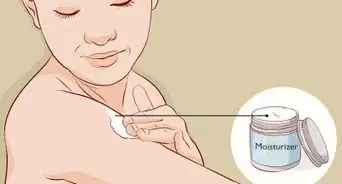 How to Exfoliate for Radiant, Smooth Skin (Plus Product Recommendations)
How to Exfoliate for Radiant, Smooth Skin (Plus Product Recommendations)

 How to Get Hair Dye Off Skin Quickly at Home
How to Get Hair Dye Off Skin Quickly at Home
 A Complete Guide to Skin Icing: Is It Good for Your Face?
A Complete Guide to Skin Icing: Is It Good for Your Face?

-Step-12-Version-3.webp)

 How to Give Yourself Totally Cute Freckles Safely
How to Give Yourself Totally Cute Freckles Safely

 6 Easy Ways to Get Rid of a Cleft Chin
6 Easy Ways to Get Rid of a Cleft Chin


References
- https://www.allure.com/story/how-to-cocktail-skin-care-ingredients
- https://www.medicinenet.com/script/main/art.asp?articlekey=43073
- https://www.cosmopolitan.com/style-beauty/beauty/a25372431/what-order-to-apply-skincare-#products/
- https://www.dermatologynwhouston.com/tips-for-choosing-the-right-skincare-products/
- https://www.aad.org/public/everyday-care/skin-care-basics/care/skin-care-tips-dermatologists-use
About This Article

